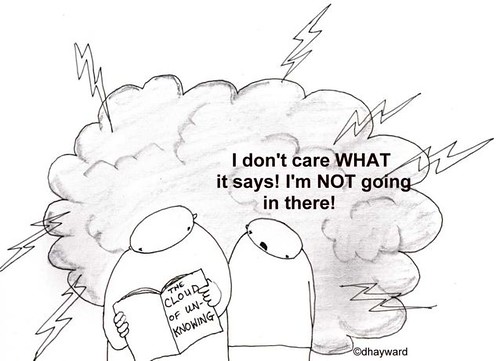 How do you genuinely not know God? The knack apparently is to set aside everything we know about God, except for God. This is the teaching to be found in The Cloud of Unknowing , which is an example of the insights Christian mystics have made. Here is a passage quoted in the Wikipedia article at the end of the above link.
How do you genuinely not know God? The knack apparently is to set aside everything we know about God, except for God. This is the teaching to be found in The Cloud of Unknowing , which is an example of the insights Christian mystics have made. Here is a passage quoted in the Wikipedia article at the end of the above link.
Our intense need to understand will always be a powerful stumbling block to our attempts to reach God in simple love [...] and must always be overcome. For if you do not overcome this need to understand, it will undermine your quest. It will replace the darkness which you have pierced to reach God with clear images of something which, however good, however beautiful, however Godlike, is not God.
It might also be worth reading the following post in my other blog , which covers several others saying similar things.
We lack the language to express these things and even words we think of as certain can loop around with unexpected meanings. Take the word materialism. This can be used in two ways that are relevant to our interests.
It is used by atheists who believe the universe is made of matter, and spirit does not exist. I have discussed this in my other blog, starting here . Just one example of what I mean. Belief in a material universe includes belief in nothing. Is it possible to imagine nothing? I don't mean the number zero, or what we say is in a box after we've emptied it but absolutely nothing. Have a go, imagine it if you can. There would be no space and no time. Just about possible; the problem is we are conscious beings and our consciousness is always present. What if there is no such thing as nothing? What if there is always consciousness? Atheists don't believe in God; why can't theists not believe in nothing? Come on, there is no evidence whatsover for the existence of nothing, how could there be? The materialist atheist has to concede ultimately there is no more a priori reason for the atheist position as there is for the theist.
The recent atheist campaigns have drawn Christians' attention to their a priori assumptions. I welcome this and have claimed atheists are angels . But is it not reasonable to ask atheists to do the same and re-examine theirs?
We all create our own realities. Everything we perceive has been filtered by our senses and our brains. We cannot conceive of nothing without using our conscious minds. We cannot conceive of anything at all without our conscious minds. We are saved from solipsism because at some point we encounter other minds. We might fall in love with one or more of them or we might hate or fear them. All this is in our minds. Somehow, our institutions are created by our minds together and so we collectively create our institutions.
This is the other meaning of materialism. It means to understand the spiritual entities described in our religious stories as creations of our collective consciousnesses. We lose control because we cannot know all the contributions made by all who are involved. All of this fully engages our attention from an early age, it is formed by the stories we are told, eg of Father Christmas.
And God? Somehow God is the reality beyond all this, a reality that enables us to see clearly. Perhaps all things are held in God's consciousness. We encounter God, on the interface between the material world and consciousness. Consciousness is as fundamental as the material universe, it is only through consciousness we know the material world at all.

Comments